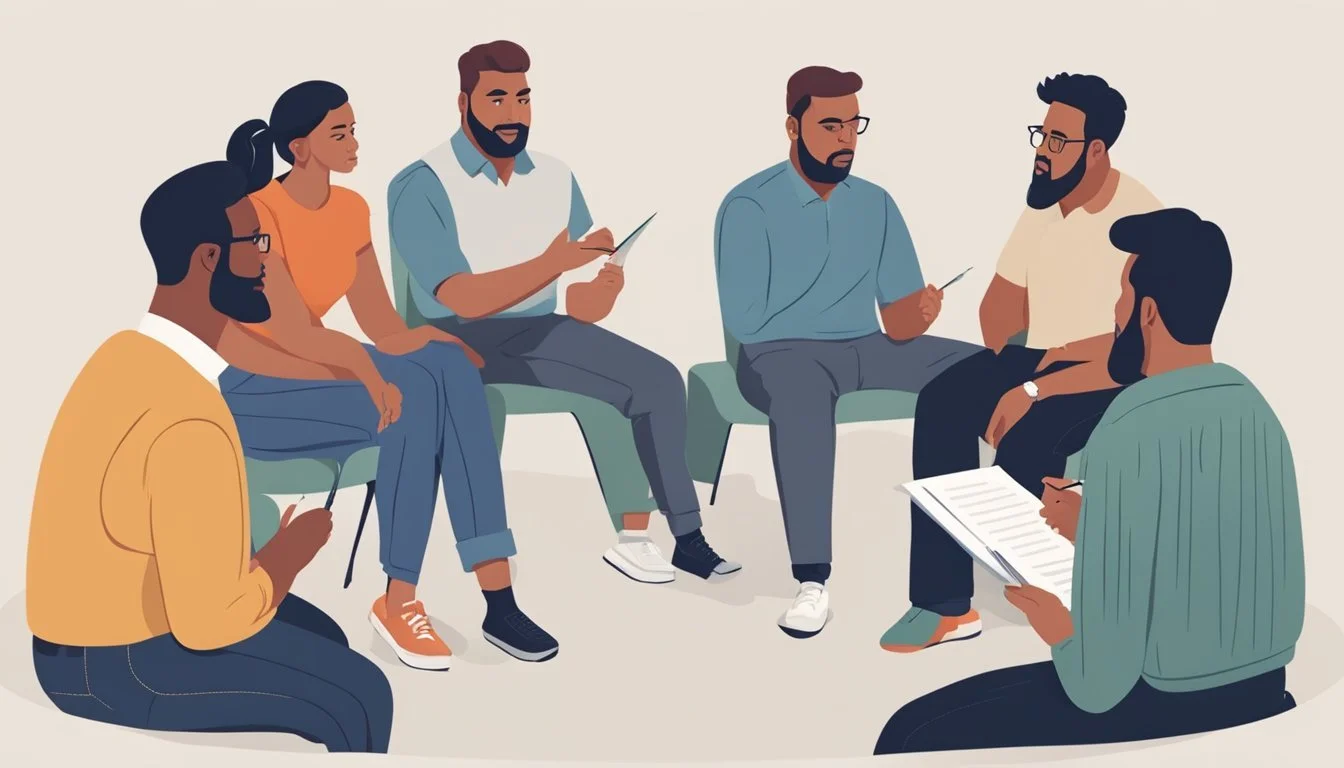8 Strategies for Dealing with a Narcissistic Group Member or Volunteer
Practical Tips and Tactics
Narcissistic behavior can significantly disrupt group dynamics and volunteer settings, causing frustration and inefficiencies. Groups striving for cohesion and productivity must navigate the challenges presented by such individuals skillfully.
ctively manage a narcissistic group member is crucial to maintaining a healthy, balanced environment. By implementing strategies tailored to address narcissistic tendencies, teams can foster positive interactions and ensure that all members contribute constructively.
1) Communicate Boundaries Clearly
Establishing clear boundaries is crucial when dealing with a narcissistic group member or volunteer. Narcissistic individuals often disregard the personal space and limits of others, so it’s important to be explicit and assertive.
Use simple and direct language when setting these boundaries. Avoid ambiguity to prevent misinterpretation or manipulation of your words. State your limits firmly without feeling the need to justify or defend your reasons.
It’s also effective to limit emotional engagement. Narcissists thrive on emotional reactions, so maintaining a calm and composed demeanor helps to keep the interaction professional and controlled.
When communicating, use "I" statements to emphasize your feelings and needs. For example, say "I need you to respect my time by not interrupting me during meetings." This shifts the focus to your personal boundaries rather than accusing them directly.
Document these boundaries if necessary, especially in group settings where others can hold the individual accountable. Written agreements or formalizations ensure that there is no confusion about what has been established.
By consistently enforcing these boundaries and remaining firm, it becomes easier to manage interactions and safeguard one’s emotional well-being. Boundary clarity is essential for fostering a respectful and productive group environment.
For more approaches on setting boundaries, visit this resource.
2) Document All Interactions
It is vital to document all interactions when dealing with a narcissistic group member or volunteer. Keeping thorough records of communications can protect and support everyone involved.
Maintain a log of emails, messages, and any in-person conversations. This log should include dates, times, and key points discussed.
If possible, confirm agreements or decisions through written communication. This helps create an indisputable record of what was said and agreed upon.
Use tools like email threads and recorded messages to keep track of conversations. These can serve as evidence if disputes arise.
Regular updates and notes in a shared digital space can ensure transparency. This practice keeps all team members informed.
Having a clear, factual record helps in managing conflicts and misunderstandings. It provides a basis for addressing any problematic behavior effectively.
Taking these steps ensures that everyone has a clear understanding of expectations. This can contribute to a more harmonious working environment.
3) Seek Mediation Early
Engaging a mediator early in the process can help manage the disruption a narcissistic group member might cause. Mediation provides a structured environment where discussions can be guided, and conflicts kept under control. This proactive step can prevent the situation from escalating further.
Mediation creates a neutral ground for all parties involved. A skilled mediator understands how to handle individuals with narcissistic traits and can use strategies to keep the communication effective. This can be crucial in maintaining focus on group objectives.
Preparing for mediation is essential when dealing with a narcissist. Frame ideas in a way that aligns with their interests and make suggestions seem like their own. This can make them more receptive and cooperative during mediation sessions.
Focusing on core goals and setting clear boundaries can be helpful. It’s important to communicate your limits and remain calm, even if the narcissistic member becomes aggressive. Professional guidance, such as the one provided at Mediate.com, offers detailed strategies for managing such dynamics effectively.
Seeking mediation early also sends a clear message that disruptive behavior won't be tolerated. This proactive stance can deter future conflicts and ensure that the group or project stays on track.
4) Practice Emotional Detachment
Dealing with a narcissistic group member or volunteer requires maintaining emotional detachment. This involves creating a mental space where their actions and words do not affect your emotional well-being.
Recognize that narcissistic individuals often thrive on eliciting strong emotional reactions. By remaining calm and composed, you can mitigate their impact on your mental health.
Limit your emotional responses to their behavior. Refrain from engaging in conflict or reacting to provocation. Practice mindfulness techniques to stay centered during interactions.
Keep interactions professional and task-focused. Avoid sharing personal details or emotional vulnerabilities. This reduces any ammunition they may use against you.
Use strategies like grounding exercises or deep breathing to stay detached in challenging moments. These techniques can help maintain your focus and emotional stability.
Seeking support from a mental health professional can provide valuable tools and techniques for managing emotional detachment effectively. Engaging in regular self-care further strengthens your capacity to stay emotionally detached.
Remember, practicing emotional detachment is not about being indifferent. It's about protecting your emotional well-being while maintaining a constructive and professional environment.
5) Focus on Solutions, Not Problems
When dealing with a narcissistic group member or volunteer, shifting the focus from problems to solutions can be highly effective. Complaints and criticisms are often magnified by narcissists, leading to unnecessary conflict and frustration.
Encouraging solution-oriented conversations can help. Instead of allowing discussions to spiral into negativity, guide them towards finding constructive outcomes. This approach fosters a more positive environment and diminishes the narcissist’s tendency to dwell on conflicts.
Setting clear, achievable goals helps maintain this focus. By identifying specific targets, the group can concentrate on actionable steps. This not only mitigates the narcissist's disruptive behavior but also promotes a collaborative spirit within the group.
Active listening plays a crucial role. Acknowledging their concerns without feeding into the drama can de-escalate potential conflicts. Offer practical suggestions and keep discussions forward-thinking.
Using established techniques such as brainstorming sessions can also be beneficial. It engages everyone in the problem-solving process and shifts attention away from individual grievances. By collectively working towards solutions, the group can reinforce a sense of unity and purpose.
Maintaining this positive focus requires consistency. Continuously redirect discussions towards solutions to minimize the narcissist's impact on group dynamics.
6) Avoid Direct Confrontation
Direct confrontation with a narcissistic group member can often lead to escalated conflict and defensiveness. Narcissists are notably sensitive to criticism.
When it becomes necessary to address an issue, framing feedback positively is crucial. For example, instead of negative feedback, offer constructive suggestions.
In group settings, take advantage of the group dynamics by addressing issues collectively. This makes dysfunctional behavior more noticeable and less tolerated.
Maintaining calmness in your interactions can prevent an emotional reaction. Narcissists may try to provoke anger or frustration. Staying composed can mitigate this.
For further tips, review methods to deal with narcissistic behavior on Anchor Therapy.
7) Leverage Group Support
Creating a supportive group dynamic can help manage a narcissistic member or volunteer effectively. A group that works together can diminish the influence of disruptive behaviors showing that they will not tolerate such actions.
Encourage open communication within the group. When team members share experiences and feelings, it can reduce the negative impact of the narcissistic individual.
Using group settings highlights inappropriate behaviors, making it less likely for the narcissistic member to act out. Peer reactions can often deter disruptive actions more effectively than individual confrontations.
Ensure that the group remains united in their approach. A consistent and united front can help manage the narcissistic behavior more effectively by reducing opportunities for manipulation. Regular check-ins and meetings can help maintain this unity.
Consider joining specialized support groups focused on dealing with narcissistic behaviors. These groups provide valuable resources and coping strategies. Websites like Verywell Mind offer ways to find these support networks.
Professional guidance can also aid the group in managing the narcissistic member. Therapists and counselors experienced in group dynamics and narcissistic abuse can provide strategies and tools to handle the situation better. Consult local mental health clinics for recommendations on support groups or professional advice.
Maintaining a strong and cohesive group can mitigate the challenges posed by a narcissistic member, fostering a healthier and more productive environment for everyone involved.
8) Establish Firm Deadlines
Setting firm deadlines is crucial when managing a narcissistic group member or volunteer. Clear timelines help instill a sense of accountability and urgency.
By defining specific due dates, the group can monitor progress more effectively. It reduces the chances of the narcissist manipulating the schedule to suit their own needs.
In group settings, deadlines help ensure that all members contribute equally. This can mitigate any tendencies the narcissist may have towards procrastination or blaming others.
Consistent follow-up on these deadlines is key. Regular check-ins prevent any backsliding and maintain the group's momentum. Establishing a culture where deadlines are non-negotiable helps reinforce collective responsibility.
Moreover, firm deadlines help minimize conflicts. Clear expectations reduce misunderstandings and provide a basis for objective discussions about progress or issues.
For more tips on managing difficult personalities, check out strategies for managing a narcissistic boss.
Always remember that firm deadlines create structure and balance within the group, essential for handling any challenging member effectively.
Understanding Narcissistic Behavior
Narcissistic behavior often includes traits such as a grandiose sense of self-importance, a need for admiration, and a lack of empathy. In group settings, these traits can significantly disrupt dynamics and create challenges for cohesion and productivity.
Traits of a Narcissistic Individual
Narcissists typically exhibit a notable sense of entitlement and superiority. They often believe they deserve special treatment and may react negatively when this is not provided. Recognition and admiration from others are critical for them, driving many of their actions and interactions.
A lack of empathy is another distinguishing trait. Narcissists may struggle to understand or consider the feelings and needs of others. This can lead to manipulative or exploitative behaviors as they prioritize their needs above all else.
They also tend to have a fragile self-esteem masked by arrogance. Criticism or perceived slights can lead to intense emotional reactions such as anger or withdrawal. This fragile self-view often makes them highly sensitive and reactive in interpersonal situations.
Impact on Group Dynamics
In groups, narcissistic behavior can severely impact cohesion and functionality. Narcissists may dominate conversations, undermine others, or dismiss any ideas that do not align with their own perspectives. This often leads to tension and reduced morale among group members.
Their need for recognition and admiration can result in competitive rather than collaborative behavior. They may take credit for others' work or seek constant validation from the group, which can cause resentment and decreased group productivity.
A lack of empathy means they rarely consider the collective needs of the group. Decisions and actions are often self-serving, disrupting teamwork and mutual support. This focus on personal gain can create a toxic environment, making it challenging to achieve group goals efficiently.
Communication Strategies
Effectively dealing with a narcissistic group member or volunteer requires setting firm boundaries and using specific communication techniques. This approach minimizes conflict and promotes a more productive environment.
Setting Boundaries
Establishing clear boundaries is crucial when interacting with a narcissistic individual. Be explicit about acceptable behavior and the consequences of crossing these limits. For example, if a group member consistently interrupts others, explicitly state that this behavior is unacceptable and will result in specific actions, such as being excluded from meetings.
Keep boundaries consistent. Inconsistency can lead to confusion and exploitation of the rules. Use direct communication to assert boundaries, such as saying, "When you interrupt, it disrupts the meeting; please wait your turn to speak."
Maintaining professionalism is essential. Avoid emotional reactions, as narcissists may use them to manipulate or gain control.
Effective Communication Techniques
When communicating with a narcissist, use clear, concise language. Frame your statements by focusing on your feelings and needs. Phrases like "I feel" and "I need" can be effective. For example, "I feel frustrated when deadlines are missed; I need timely updates to manage the project efficiently."
Active listening can also help in managing interactions. Show that you hear and understand their concerns by repeating back what was said, which can de-escalate potential conflicts.
Avoid engaging in power struggles. Narcissists often try to dominate conversations. Stay calm and stick to facts, steering the conversation back to the topic at hand. Seeking professional support, like therapy or joining support groups, is beneficial for accumulating effective techniques for managing difficult interactions with narcissists.








